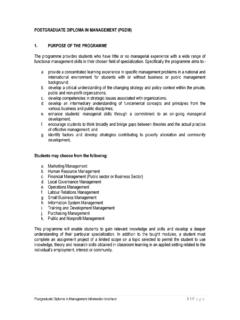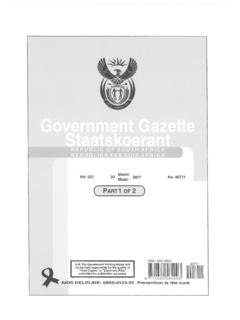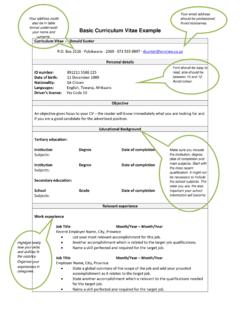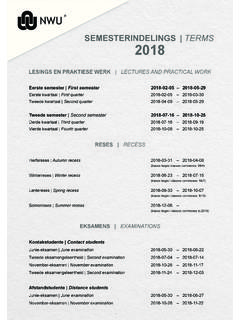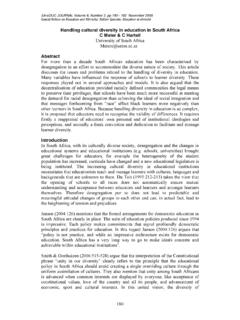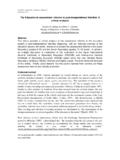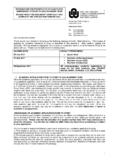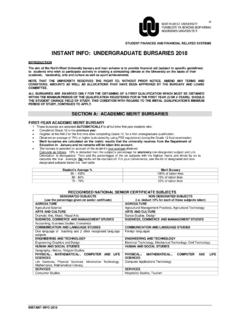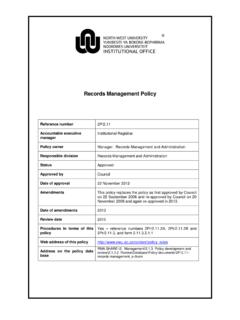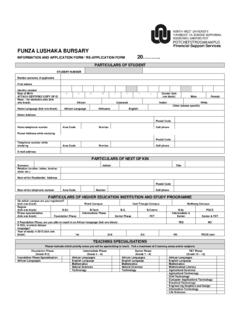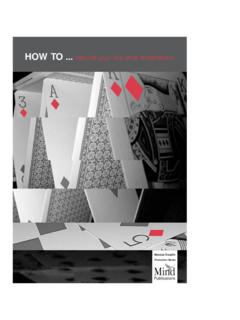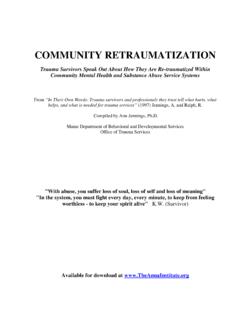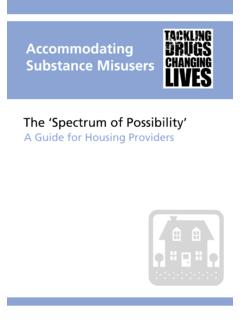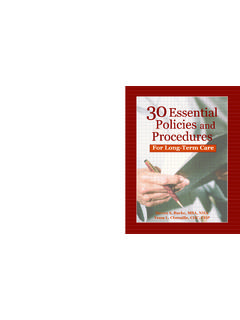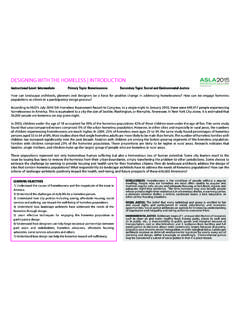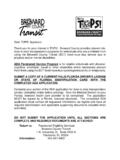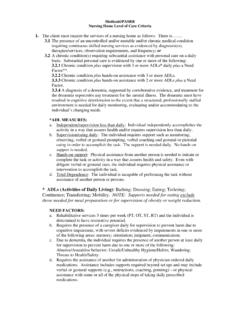Transcription of THE INTELLECTUALLY IMPAIRED FOUNDATION-PHASE …
1 SA-eDUC JOURNAL Volume 10, Number 1 March 2013 1 THE INTELLECTUALLY IMPAIRED FOUNDATION-PHASE LEARNER HOW CAN THE TEACHER SUPPORT THESE LEARNERS? Weeks Dept. of Teacher Education University of South Africa E-mail: Telephone: (w): 0124294672; (cell): 0794943436 Fax: 012- 4294800 J. Erradu Principal: Open Gate School for Special Needs Learners E-mail: Telephone: (w): 033-3425281; (cell): 0835683210 Fax: 033- 3420104 Weeks Erradu J.
2 The INTELLECTUALLY IMPAIRED foundation phase learner how can the teacher support these learners? IN WHAT WAY CAN THE INTELLECTUALLY IMPAIRED LEARNER IN THE FOUNDATION PHASE BE SUPPORTED IN THE CLASSROOM? A CASE STUDY and J. Erradu ABSTRACT Seven per cent of South African learners, with barriers to learning, are enrolled at special schools. This study focuses on the learner in the Foundation Phase, experiencing severe intellectual barriers to learning.
3 Notwithstanding the strategies advocated in the White Paper 6, little support has been forthcoming for such learners, as outlined in this policy document. Apart from the National Strategy on Screening, Identification, Assessment and Support (SIAS), few support packages have been published. However, this document focuses mainly on support packages for learners who do not have cognitive barriers to learning. In the absence of government support for these learners, educators have been left to create and implement their own innovative means of accommodating the needs of learners with intellectual barriers to learning.
4 Educators themselves, however, also need support in providing high-intensity assistance for learners who experience intellectual barriers to learning. This article investigates ways in which educators have adapted the curriculum in terms of methodology, content and learner/teacher-support materials. Concepts are clarified and the discussion explores the implementation of the SIAS document, and how the learning environment is adjusted to support learners with special needs. The article concludes with recommendations for ensuring that learners experiencing barriers to learning receive the highest possible levels of support from all the stakeholders.
5 Key Words: FOUNDATION-PHASE learners, intellectual barriers to learning, high-level support, actualisation of potential, educators. INTRODUCTION I was slightly brain damaged at birth and I want people like me to see that they shouldn t let a disability get in the way. I want to raise awareness I want to turn my disability into ability. Susan Boyle, 2009:1 According to the latest statistics (2011), there are four hundred special schools in South Africa ( ), with 102 057 learners enrolled at these special schools, comprising 0,7% of the total population of learners, enrolled at all schools (authors emphasis) in the country ( ).
6 The Education White Paper 6: Building an Inclusive Education and Training System was launched amid much fanfare by the late Minister of Education, Professor Kader Asmal in 2001. This policy advocated an inclusive approach to education; and it reflected a paradigm shift as far as education for SA-eDUC JOURNAL Volume 10, Number 1 March 2013 3 learners who experience barriers to learning was concerned. This policy legislated that no learner should be prevented from participating in the education system regardless of his/her physical, intellectual, social, emotional, language or other differences thereby implying that all learners should have access to education, to the curriculum, and to support when needed, so that the full potential of each learner can be actualised (Department of Education, 1997:54).
7 However, the impressive policies and objectives encapsulated in the White Paper require appropriate support strategies to ensure that the outcomes of the envisaged policy are achieved in practice. The most crucial aspect of the Education White Paper 6 is the need for government to provide the necessary support for learners who require high levels of support. However, this support has not been forthcoming in the manner outlined in the policy document. Besides the publication of the National Strategy on Screening, Identification, Assessment and Support (SIAS) school pack published in 2008, very few support packages and/or programmes have been published to enable educators at special schools and at special-school resource centres, to offer help to learners who experience severe intellectual barriers to learning.
8 The SIAS document focuses mainly on support packages for learners who do not have cognitive barriers to learning, with the result that educators at these special schools and special-school resource centres have been left to develop their own innovative ideas in designing support programmes and differentiating the curriculum for learners who experience severe intellectual barriers to learning. Educators themselves need support , in order to, in turn, provide high-intensity support to learners who experience severe intellectual barriers to learning. There is, therefore, a need to research the shortcomings in the Education White Paper 6, in order to fill this void.
9 Prior to the paradigm shift to inclusive education, support at schools for learners who experience barriers to learning, focused on developing the learner to meet the demands of the mainstream curriculum (Department of Education, 2001:5). However, the curriculum itself was not differentiated significantly to meet the needs of these learners (KZN Department of Education, 2005:6). With the implementation of Inclusive Education, educators at schools that cater for learners who are severely INTELLECTUALLY IMPAIRED have had to adapt the curriculum to suit the needs of their learners.
10 The limited number of special schools in South Africa implies that many learners who experience severe intellectual barriers to learning are deprived of access to special services, leading to their marginalisation and exclusion from additional support (Department of Education, 2001:9). Accordingly, in the absence of formalised and structured support strategies, educators at these special schools have to devise and implement school and individual-based support strategies for such learners. Additional support in terms of curriculum differentiation is, therefore, vital if the learner is to succeed, since these learners need high levels of support.
